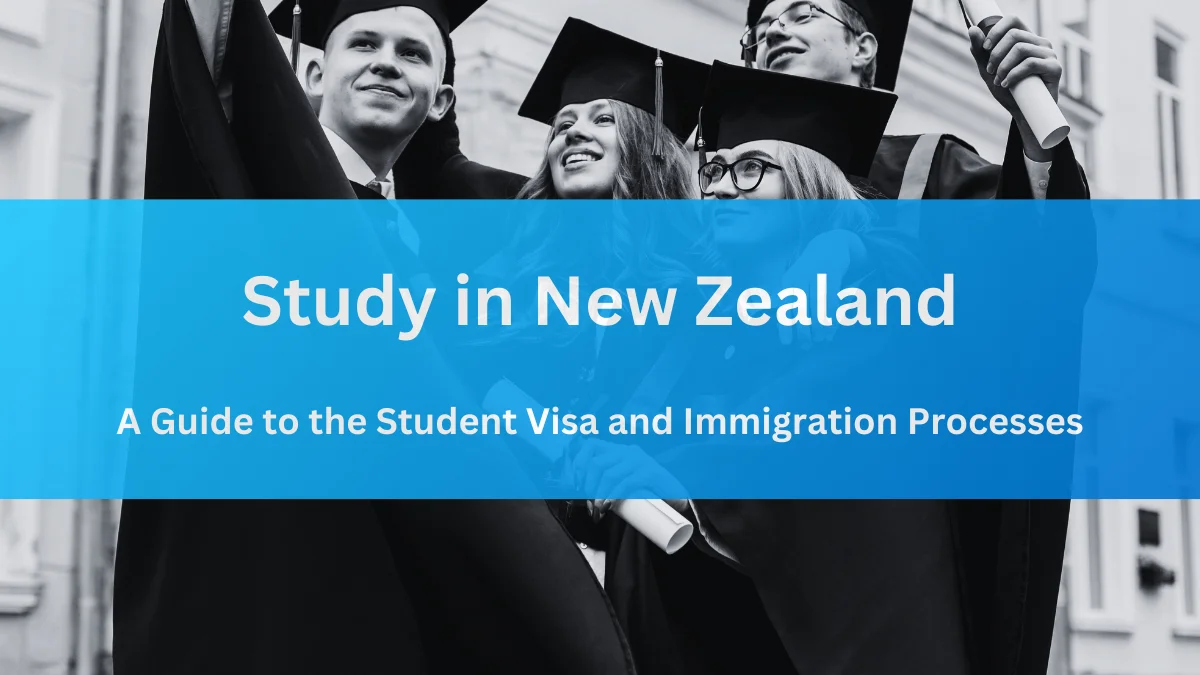Study in New Zealand: Navigating the Process of Student Visas and Immigration
New Zealand, a stunning island nation known for its breathtaking landscapes and high quality of life, has become a popular destination for international students seeking a world-class education. Obtaining a student visa is a crucial step in making your study dreams a reality. If you are planning to study in New Zealand, This blog aims to guide you through the entire process, providing clear and concise information to ensure a smooth transition.

Our goal is to equip you with the knowledge and tools necessary to successfully navigate the student visa application process for study in New Zealand. We will cover everything from understanding the different types of student visas to preparing your application, addressing common challenges, and providing valuable resources. By the end of this blog, you will have a comprehensive understanding of what it takes to obtain a student visa and embark on your academic journey in New Zealand.
The Different Types of Study in New Zealand Visas for Students
There are three primary types of student visas available for study in New Zealand:
- Fee-Paying Student Visa: This visa is suitable for students who are self-funding their education and living expenses.
- Exchange Student Visa: This visa is intended for students participating in exchange programs arranged by their home institution.
- Pathway Student Visa: This visa is for students who are undertaking a series of courses leading to a qualification.
Visa Duration and Conditions
The duration of your study in New Zealand visa will depend on the length of your approved course. It’s important to note that student visas typically allow for a certain amount of part-time work while studying. However, there are specific conditions and limitations that you must adhere to.
Are you Eligible to Study in New Zealand?
To be eligible for a student visa, you must:
- Have an offer of acceptance into an approved course at a recognised New Zealand institution.
- Demonstrate sufficient financial resources to cover your tuition fees and living expenses.
- Meet the health and character requirements set by Immigration New Zealand (INZ).
Language Requirements
Proficiency in English is a fundamental requirement for most student visas. To study in New Zealand, you will need to provide evidence of your English language skills through a recognised test, such as IELTS or TOEFL.
Health and Character Checks
As part of the application process, you may be required to undergo a medical examination and provide a police clearance certificate. These checks ensure that you meet the health and character standards for entry into New Zealand.
Preparing Your Application to Study in New Zealand
To successfully submit your student visa application and study in New Zealand, you will need to collect the following documents:
- Offer Letter: A letter from the educational institution confirming your acceptance into the course.
- Proof of Funds: Bank statements, scholarship letters, or other financial documentation demonstrating your ability to cover tuition and living expenses.
- Passport: A valid passport that will remain valid throughout your intended stay in New Zealand.
- Visa Application Form: The completed and signed visa application form provided by INZ.
Financial Requirements
Demonstrating sufficient financial resources is a crucial aspect of the visa application process. You may need to provide evidence of:
- Personal Savings: Bank statements showing your savings.
- Scholarships: Letters or awards confirming scholarship funding.
- Loans: Loan approval letters or documentation.
Health and Travel Insurance
It’s highly recommended to have comprehensive health insurance that covers the duration of your stay in New Zealand. Additionally, travel insurance can provide protection against unforeseen circumstances such as lost luggage or medical emergencies.
The Application Process to Study in New Zealand
The majority of student visa applications are submitted online through the Immigration New Zealand (INZ) website. To apply, you will need to create an INZ account and follow the step-by-step instructions.
Application Fees
There is a visa application fee associated with student visas. The exact fee may vary, so it’s important to check the current rates on the INZ website. You will need to pay the fee using the designated payment methods.
Processing Time
The processing time for student visa applications can vary depending on various factors, including the volume of applications and the complexity of your case. To allow for potential processing delays, it’s advisable to submit your application well in advance of your intended travel date.
What to Look for After Receiving Your Visa
Once you receive your student visa, it’s essential to carefully review the conditions attached to it. These conditions may include requirements such as maintaining enrollment in your course, making satisfactory academic progress, and adhering to any work restrictions. You will always need to follow these regulations while you study in New Zealand.
Working Rights and Limitations
Student visa holders may be eligible for part-time work while studying. However, there are specific rules and limitations regarding the number of hours you can work and the types of employment permitted. It’s important to familiarise yourself with these guidelines to avoid any potential violations.
Travel Arrangements
After obtaining your visa, you can start planning your travel to New Zealand. Book your flights and accommodation well in advance to secure the best deals and ensure a smooth arrival.
Tips for Settling In
- Research Local Customs: Familiarize yourself with New Zealand’s culture and customs to help you adapt more easily.
- Attend Orientation Programs: Participate in student orientation sessions to learn about campus resources, academic expectations, and local life.
- Connect with Other Students: Building relationships with fellow international students can make your transition to New Zealand more enjoyable and supportive.
Orientation and Support
Most educational institutions in New Zealand offer orientation programs to welcome new international students and provide them with essential information. Additionally, you can access various support services on campus, including academic advising, counselling, and health care.
Common Challenges and How to Overcome if You Plan to Study in New Zealand
While every effort is made to ensure a successful application, there are instances where student visa applications may be rejected. Common reasons for rejection include:
- Insufficient Financial Evidence: Not providing adequate proof of funds to support your studies and living expenses.
- Language Proficiency: Failing to meet the required English language proficiency standards.
- Health or Character Issues: Medical or character concerns that may prevent entry into New Zealand.
If your application is denied, you can request a review of the decision or reapply with additional documentation or evidence. It’s advisable to consult with an immigration advisor to understand the reasons for rejection and explore potential options.
Delays in Processing
Visa processing times can vary, and there may be instances of delays. To minimise the impact of potential delays:
- Submit Your Application Early: Apply well in advance of your intended travel date to allow for processing time.
- Check Application Status: Regularly monitor the status of your application through the INZ online portal.
- Contact INZ: If you have concerns or require updates, don’t hesitate to contact Immigration New Zealand directly.
Additional Resources to Facilitate Your Study in New Zealand
Official Immigration Resources
- Immigration New Zealand (INZ) Website: https://www.immigration.govt.nz/
- New Zealand Embassies and Consulates: Locate the embassy or consulate nearest to you for specific visa information and assistance.
Consultancy Services
Consider seeking professional guidance from a study abroad consultancy to streamline the visa application process. A consultancy can provide expert advice, assist with document preparation, and offer support throughout the application journey.
Conclusion
Obtaining a student visa to study in New Zealand can be a rewarding experience, opening doors to academic opportunities and cultural immersion. By following the steps outlined in this blog and proactively addressing potential challenges, you can increase your chances of a successful application.
Study in New Zealand FAQs
-
How much IELTS score is required for a New Zealand student visa?
A study visa for New Zealand requires students to grab at least 5.5 in each of the four IELTS bands, with an overall minimum score of 6.0 or higher for undergraduate programs. Graduate courses, on the other hand, require a minimum score of 6.0 in each band and an overall IELTS score of 6.5 or higher.
-
Can I work full-time while on a student visa?
You may be able to work full-time if: You are studying full-time for at least one academic year; and. Your course is worth more than 120 credits. Your course has a minimum of 2 semesters during at least 8 months.
-
Is Gap accepted in New Zealand?
New Zealand accepts a study gap of 10 years provided the applicant has strong work experience, necessary skills, and valid documentation that justifies this gap period.





